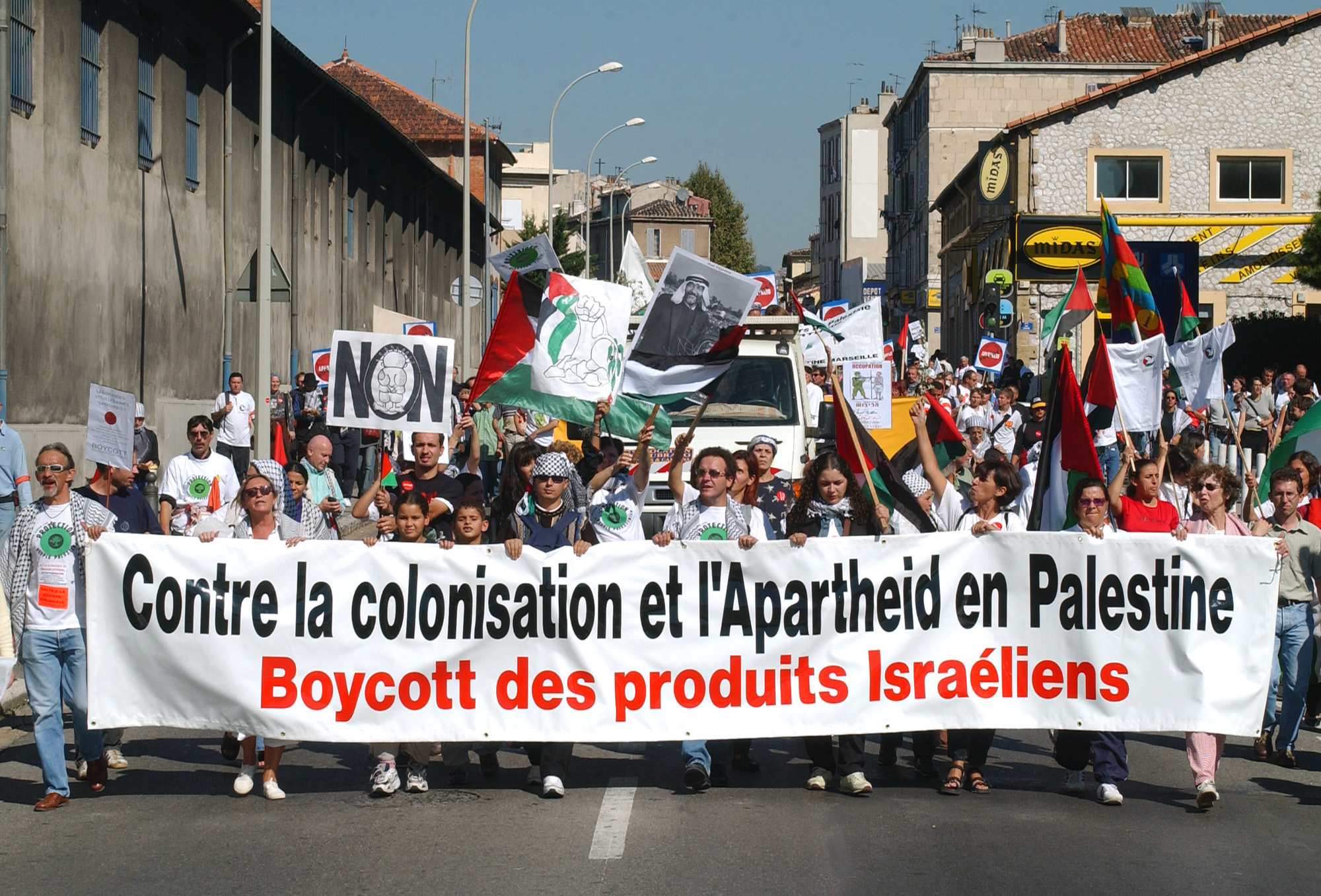Outlawing BDS and the Repression of Solidarity with Palestine

In July 2023, the British Parliament voted in support of a bill that would outlaw local councils, universities and other public bodies from boycotting foreign countries. The proposed law singles out Israel as the only state explicitly mentioned by name and seeks to protect all its colonial entities across Palestine (West Bank) and in the Syrian Golan Heights.
In justifying this move, the country’s Conservative Party argues that foreign policy is strictly a governmental affair. In Israel’s case, it goes a step further and links its ban of a boycott to a clamp down on the Palestinian-led Boycott, Divestment, and Sanctions (BDS) movement.
Boycotts and Divestments in British Public Bodies
In the UK, BDS campaigns had been making progress at the local government level. In 2010, Swansea City Council passed a resolution committing not to sign any future contracts with Veolia – the trading company leading the construction of a light rail system in occupied East Jerusalem. In the aftermath of Israel’s 2014 war on Gaza, Leicester City Council passed a policy to boycott goods produced in West Bank settlements, while Gwynedd Council voted for a trade embargo.[1]
Threatened by this success, a registered charity called Jewish Human Rights Watch brought a claim for judicial review against those three British councils. It argued that “the level of hatred that has been experienced by Jewish people today in the UK and elsewhere has much to do with the BDS movement.”[2] But in a landmark decision in 2016, the High Court in London dismissed the legal challenge and ruled that councils could continue to boycott.
Building on this momentum, in 2021 Lancaster City Council passed a motion calling to divest approximately GBP8 million invested in companies with links to Israeli colonies. In the same year, Edinburgh’s Lothian Pension Fund decided to begin boycotting the Israeli Bank Hapoalim.[3]
Divestment campaigns were also gaining traction in the UK higher education sector. In 2018, the University of Leeds became the first British institution to divest from firms supplying the Israeli occupation forces.[4] While in 2020, the University of Manchester divested nearly GBP2 million from companies complicit in the colonization of Palestine.[5]
The new UK government anti-boycott bill is precisely designed to put a stop to these solidarity actions and the achievements made by municipal and student activism. According to Michael Gove, the British minister that introduced the bill, “These [boycott, divestment and sanction] campaigns not only undermine the UK’s foreign policy but lead to appalling antisemitic rhetoric and abuse.”[6] But as the BDS movement has reiterated, it targets complicity not identity. It is not whether a company or individual is Jewish that warrants action, but rather that they are materially complicit in practices of colonization.
Repression in Germany
In weaponizing antisemitic accusations against the BDS movement, the UK government is certainly not alone. In 2021, the German Bundestag, with support from almost all political parties, passed a resolution in which BDS was condemned as antisemitic. The Bundestag explicitly relied on the International Holocaust Remembrance Alliance (IHRA) working definition of antisemitism to oppose BDS. Although the Bundestag resolution was non-binding, as found in a recent report from the European Legal Support Center, it is perceived as authoritative and is being applied as legally binding.[7]
The power of the Bundestag’s anti-BDS resolution and the IHRA definition essentially lie in appealing to sources of authority that are not enshrined in law. By drawing from these extra-legal tools, a host of highly repressive measures were applied in Germany. Organizations and Palestinians supportive of boycotts were barred from accessing public funds and public spaces. German universities, state governments, and public institutions have all denied Palestinians the right to resist their oppressors.[8]
In 2021, the German international broadcaster Deutsche Welle dismissed several Arab employees – all Palestinian or Lebanese – based on an investigation that relied on the IHRA definition.[9] In May 2022, a Nakba commemoration was banned by the Berlin police, which justified the decision citing the IHRA definition. These are not isolated instances but part of a wider trend intensifying across many countries.[10]
Challenging Repression
In recent years the US has introduced a wave of anti-boycott laws aiming to shield Israel. Building on earlier legislations to counter Arab states’ boycott of Israel in the 1970s, several American states passed laws mandating public bodies to withhold contracts, grants and investments from subjects engaging in BDS campaigns.[11] Currently, 35 American states have some form of anti-BDS legislation or executive order.[12] The UK is set to join jurisdictions such as the US, where legislation explicitly seeks to ban the use of boycotts and divestments.
While the implementation of sanctions has been meager to date, the activist group Palestine Action has been effectively targeting Israeli weapons manufacturers with a successful campaign of economic sabotage. Using direct action tactics – primarily occupying and disrupting the production of weapons factories – activists have been able to induce enough economic and reputational damage for Israel’s largest private arms firm, Elbit Systems, to shut down one of its factories in Oldham, close its London offices, and lose approximately USD350 million in contracts with the UK Ministry of Defence.[13] These “sanctions from below” offer an important corrective against government complicity and the widespread efforts to criminalize solidarity with Palestinians.
At the same time, there are civil society groups in Britain that have formed a broad coalition mobilizing specifically to challenge the anti-boycott bill, and what they call an attack on wider democratic rights and freedom of expression.[14] Peter Leary, a campaign officer at the Palestine Solidarity Campaign (PSC), says there is a growing effort across civil society to confront the government given that the proposed law would restrict a wide range of campaigns for social and climate justice.[15] Campaigns to raise awareness at the grassroots level and in the media, as well as lobbying MPs, are some of the main tactics that both established organizations and activists can deploy to try exerting some pressure. Leary also pointed out that the bill has recently entered the Committee stage, and tellingly no Palestinian organization or individual has been invited to give oral evidence. Instead, groups such as Conservative Friends of Israel, UK Lawyers of Israel and the Henry Jackson Society, a neo-conservative think tank, have been given a hearing.[16]
Notably, in 2020, the PSC defeated at the Supreme Court level a UK government regulation to prevent local government pension funds divesting from companies complicit in Israel’s oppression of Palestinians.[17] Defeated in court, the British state is now trying to push this anti-BDS measure through Parliament. The bill still faces some obstacles before becoming law – it could be amended in the next stages and in the House of Lords – but in passing the second reading it is now on the verge of marking a significant escalation against the Palestine solidarity movement. If not resisted, its ramifications would be felt beyond Britain, as it could set a precedent for other European governments to follow.
For the arabic version click here
[1] Asa Winstanley, “Welsh council embargoes Israel over Gaza “savageness””, The Electronic Intifada, 17 October 2014.
[2] Karim El-Bar, “UK court dismisses call to ban council boycotts of Israeli settlement goods”, Middle East Eye, 29 June 2016.
[3] “Further boost to BDS as UK’s Lancaster local council divests from Israel firms”, Middle East Monitor, 5 July 2021.
[4] “In first, UK university divests from firms supplying Israel army”, Middle East Monitor, 5 November 2018.
[5] “University of Manchester divests nearly £2m from companies complicit in Israel’s oppression of the Palestinian people”, Palestine Solidarity Campaign, 6 August 2020.
[6] Nadeem Badshah, “UK government expected to table bill banning boycotts of Israeli goods”, The Guardian, 17 June 2023.
[7] “Suppressing Palestinian Rights Advocacy through the IHRA Working Definition of Antisemitism”, European Legal Support Center, June 2023.
[8] Hebh Jamal, “Dear Germany, you will not repress Palestine solidarity”, The New Arab, 28 April 2023.
[9] Linah Alsaafin, “‘We are scapegoats’: Arab journalists fired by Deutsche Welle”, Al Jazeera English, 11 February 2022.
[10] For more examples, see note 7.
[11] Davina Herman and Didi Cooper, “Doing activism like a state: Progressive municipal government, Israel/Palestine and BDS”, Environment and Planning C: Politics and Space, 38(1), 2020, p. 40-59.
[12] See Palestine Legal for more information on anti-BDS legislation in the US.
[13] Huda Ammori, “Why we’re laying siege to an Israeli weapons plant”, The Electronic Intifada, 11 April 2023.
[14] See the Right to Boycott campaign.
[15] Online interview conducted on Zoom, 6 September 2023.
[16] “Economic Activity of Public Bodies (Overseas Matters) Bill”, Committee Stage, UK House of Commons, 5 September 2023.
[17] “Palestine Solidarity Campaign defeats UK Government over pensions divestment”, Palestine Solidarity Campaign, 28 April 2020.



